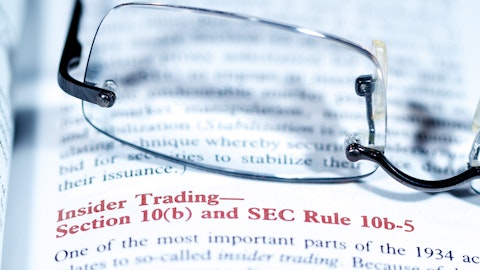A Securities and Exchange Commission rule requires corporate insiders to report their securities transactions within 48 hours, but the interpretation of insider trading data has become much more complex in recent years. The proliferation of pre-arranged trading plans and the increased usage of equity-based compensation has made it much more complicated to interpret insider trades, particularly insider sales. Nonetheless, corporate insiders usually buy shares on the open market for one straightforward reason – those shares seem undervalued. Directors and executives may already have exposure to various compensation mechanisms such as stock options, stock appreciation rights (SARs) and phantom stock plans, which means that their compensation increases along with their company’s share price. Therefore, additional buying on the part of executives and directors reveals a high degree of confidence in the future prospects of their companies. Insider Monkey processed the majority of Form 4 filings submitted with the SEC on Monday and identified three companies with the most prominent insider buying.
Academic research has shown that certain insider purchases historically outperformed the market by an average of seven percentage points per year. This effect is more pronounced in small-cap stocks. Another exception is the small-cap stock picks of hedge funds. Our research has shown that imitating the 15 most popular small-cap stocks among hedge funds outperformed the market by nearly a percentage point per month between 1999 and 2012 (read more details here).
To start with, Stage Stores Inc. (NYSE:SSI) had its most influential executive purchase a sizable block of shares this past week. President and Chief Executive Officer Michael L. Glazer snapped up 24,556 shares on Friday at prices that ranged from $6.64 to $6.77 per share. After the recent purchase, Mr. Glazer currently has an ownership stake of 628,438 shares.
Stage Stores operates 834 specialty department stores mainly in small and mid-sized towns and communities under the BEALLS, GOODY’S, PALAIS ROYAL, PEEBLES, and STAGE nameplates. The company opened a mere three new stores during 2015 and closed a much higher number of 23 stores. Moreover, Stage Stores announced plans to keep closing stores that do not deliver anticipated sales productivity and profitability. In fact, the multi-year restructuring plan announced in 2015 stipulates the closure of roughly 100 underperforming stores that account for 5% of total sales. A total of 23 stores were already closed in 2015 and roughly 25-to-30 stores are expected to close this year. Stage Stores Inc. (NYSE:SSI)’s sales were $1.60 billion in 2015, decreasing from $1.64 billion in 2014. Comparable sales, which include sales in stores open at least 14 full months and direct-to-consumer sales, decreased by 2.0% in 2015, after increasing 1.4% in 2014. The decrease in comparable sales was mainly driven by a decline in traffic, partly offset by an increase in average unit retail. To be more detailed, sales were hit by decreased consumer demand in markets near the Mexican border due to the depreciation of the Mexican peso, as well as by lower demand in energy-exposed communities in Texas, Louisiana, Oklahoma and New Mexico.
Shares of Stage Stores are down 68% in the past 12 months and currently trade at 12.5-times expected earnings, significantly below the forward P/E multiple of 20.7 for the apparel retail sector. The company pays out a quarterly cash dividend of $0.15 per share, which equates to a current dividend yield of 8.75%. Stage Stores paid roughly $18.65 million in cash dividends in 2015, while net income totaled only $3.78 million for the year. Therefore, some analysts and investors may have concerns over the sustainability of the company’s dividend payment. Even so, Stage Stores’ 2015 bottom-line figure included one-time expenses related to strategic store closures, corporate headquarters consolidation, and workforce reduction initiatives, so the company’s adjusted net income figure was much higher. Moreover, the company’s multi-year plan to close down underperforming stores will most likely have a positive impact on bottom-line figures, which makes us believe that the company’s dividend is not in danger just yet. The hedge fund sentiment towards the retail chain operator declined notably in the December quarter, as the number of funds with stakes in the company dropped to five from 12 quarter-on-quarter. Royce & Associates, founded by Chuck Royce, owns 626,600 shares of Stage Stores Inc. (NYSE:SSI) as of December 31.
Follow Stage Stores Inc (NYSE:SSI)
Follow Stage Stores Inc (NYSE:SSI)
Receive real-time insider trading and news alerts
Let’s head to the next pages of this article, where we discuss the insider buying registered at Bazaarvoice Inc. (NASDAQ:BV) and EVINE Live Inc. (NASDAQ:EVLV).





